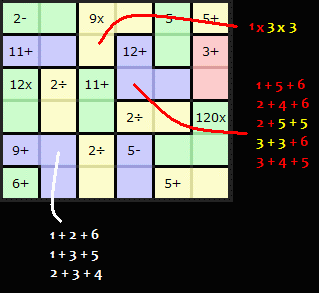| Main Page - Back |
|
From SudokuWiki.org, the puzzle solver's site |

KenDoku Dog Legs
I coined 'dog legs' back when I was making and solving Killer Sudoku. Some Killer Sudoku puzzles will contain cages which span three boxes and these can potentially contain two numbers which are the same. The convention with Killer Sudoku (which I certainly adhere to, but others may not), is that whatever permissable combinations in that cage, no combinations will contain duplicate numbers. These cages look like they 'dog leg' across boxes.
With KenKen and KenDoku 'dog leg' cages are extremely common and are part of the puzzle. Combinations of numbers can potentially contain duplicates and even double duplicates and triplets. Some examples are below.
It is helpful to spot these dog legged cages since the number of combinations you will have to consider will increase and I treat these differently using yellow in the hover over.
With KenKen and KenDoku 'dog leg' cages are extremely common and are part of the puzzle. Combinations of numbers can potentially contain duplicates and even double duplicates and triplets. Some examples are below.
It is helpful to spot these dog legged cages since the number of combinations you will have to consider will increase and I treat these differently using yellow in the hover over.

The more complate 12+ has five possible combinations. Two of them are highlighted to show they contain duplicates.
The last cage indicated shows a 'dog leg' 3-cell cage with 9+. However, since it is entirely contained within a single box no duplicates can exist. Three combinations are possible.